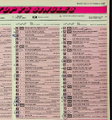Talk:The Boy With The Thorn In His Side (single)
So, this single's release date (probably sourced from the Wikipedia page) is supported by contemporaneous music magazine sources (both U.K.'s Music Week and Record Mirror). Since these publications are in accord with what's already here, it would be nice to see the chart entry date for this single--since it's still a Rough Trade property (though, granted, it's a bit further along in the band's career and fame than Hatful). Unfortunately, all I see in this wiki entry is what seems to be the highest chart entry. Anyone got a chart entry date? Cheers. Alainsane (talk) 15:35, 17 December 2024 (PST)
FWD:
Music week..
A lot of this stuff is conflated by people using things like the indie chart. Music Week started showing the various genres with lots of extra stuff like airplay and the above does not show up on a search. It is from October 5. If you look at issues prior, you can see radio 1 charts showing it got airplay prior to Oct 5 and that appears to validate the release date, but you can see it conflicts with the chart placement at #26 (later issues at least confirm the charting date).
Official Singles Chart is searchable and seems accurate. This one shows week 1 entry at #26, 28 September 1985 - 4 October 1985. Week 2 it hit peak of #23.
28 September 1985 - 4 October 1985
Davidt (talk) 07:35, 19 December 2024 (PST)
Figured out the 'four tildes' meant the MediaWiki signatures feature.
https://www.mediawiki.org/wiki/Help:Signatures
Suggest the chart info is amended from 23 to 26 unless any objections Famous when dead (talk) 08:34, 19 December 2024 (PST) <- that's exciting. Don't think any digital archaeologists will be too bothered in 100 years time... :)
tldr: I find Record Mirror and Smash Hits and Number One release date blurbs much more reliable (and specific) than Music Weeks release date content. The former publications' information is often repeated/reinforced across different publications, issues, and even across different blurbs within a given issue. Chart information is a different matter and should be better (considering its target audience) in Music Week than the others. My interest has not been about chart entry/positions, so I've given that data far less attention.
Music Week is an industry paper--geared towards industry professionals who were involved in the promotion, distribution, stocking, and tracking of acts and titles: both in radio and retail. Record Mirror (along with the others) was a lay music fan-targeted journal geared towards the folks who would ultimately buy these records, go to these shows, watch these TV spots, etc. It's far more in the interest of Record Mirror (and the others) to get its information correct--so they're not misleading fans who would are chomping at the proverbial bit to get their favorite bands' newest records/shows as soon as they can. When Music Week got their release dates wrong or simply omitted them (which happened a lot), the stakes for those errors are not nearly as high as the fan mags annoying the crap out of their rabid fan readers. I'm in the midst of years of comparative research into all the U.K. release dates of all my albums by U.K. bands. This comprises around 900 albums from 410 different U.K. artists. So, I'm in these publications a lot. Most Music Week release date content is found on two pages: "New Albums" and "New Singles", and while those pages include a date range they do not ultimately indicate which day of the week within those ranges. As late as 1985 (which is where I am right now in my research), release dates are still oscillating wildly between Mondays and Fridays (bank holidays excepted). Somewhere in the latter 80s, this will cease to be the case: Monday will become the standard for a long while after. But during the early times in The Smiths' lifespan, it's mostly Fridays but occasionally with a Monday thrown in (often along singles/albums lines). Alainsane (talk) 12:21, 19 December 2024 (PST)
Not to further muddy the proverbial waters, but were these U.K. charts *ever* about radio play, or were they strictly about sales. And if the latter, are we talking sales to retail outlets or retail outlet reported-back sales of those albums to customers? I have repeatedly seen U.K. albums get awarded Gold or Platinum status before the album had even hit the shelves, so those BPI awards were clearly about sales to outlets--not about outlet sales to customers. But what about these charts?Alainsane (talk) 13:02, 19 December 2024 (PST)
